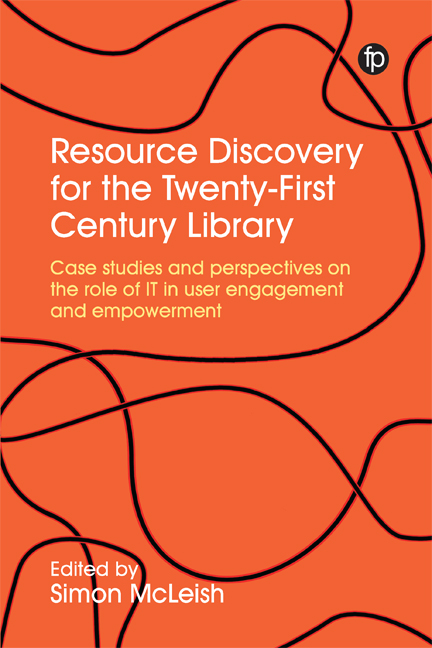Book contents
- Frontmatter
- Contents
- Figures and Tables
- Contributors
- Foreword: Library Discovery Directions
- 1 Introduction: Technology and Resource Discovery
- 2 Flipping the Catalogue: Taking Resource Discovery to the Next Level
- 3 Breaking the Record: Liberating Data into Knowledge at the National Library Board of Singapore
- 4 Case Study: Clearing Library Discovery-to-Access Pathways for IEEE Content
- 5 Case Study: Putting Discovery at the Heart of the Library Experience
- 6 Investigating Resource Discovery Needs at the University of Oxford
- 7 ‘Why Can’t you Just Use Google?’
- 8 Exposing Collections and Resources Effectively
- 9 Open Source Discovery using Blacklight at the University of Hull
- 10 A World of Curated Knowledge: Leveraging the Wider Semantic Web to Enhance Library Discovery
- 11 Cultural Discovery: Trends and Futures
- 12 Discovering the Future
- Editorial Afterword
- Index
3 - Breaking the Record: Liberating Data into Knowledge at the National Library Board of Singapore
Published online by Cambridge University Press: 23 July 2020
- Frontmatter
- Contents
- Figures and Tables
- Contributors
- Foreword: Library Discovery Directions
- 1 Introduction: Technology and Resource Discovery
- 2 Flipping the Catalogue: Taking Resource Discovery to the Next Level
- 3 Breaking the Record: Liberating Data into Knowledge at the National Library Board of Singapore
- 4 Case Study: Clearing Library Discovery-to-Access Pathways for IEEE Content
- 5 Case Study: Putting Discovery at the Heart of the Library Experience
- 6 Investigating Resource Discovery Needs at the University of Oxford
- 7 ‘Why Can’t you Just Use Google?’
- 8 Exposing Collections and Resources Effectively
- 9 Open Source Discovery using Blacklight at the University of Hull
- 10 A World of Curated Knowledge: Leveraging the Wider Semantic Web to Enhance Library Discovery
- 11 Cultural Discovery: Trends and Futures
- 12 Discovering the Future
- Editorial Afterword
- Index
Summary
Introduction
Singapore is a bustling city state in South East Asia with a population of 5.6 million. It is a young nation, having become a sovereign republic only in 1965. In Singapore, the National Library, the National Archives and the Public Libraries Network are run as one united heritage organisation under the National Library Board (NLB). As stewards of the national patrimony, the NLB is implementing a digital masterplan that aims to make the joint collections of the National Library and Archives a focal point of research in Singapore for scholars, academics and our citizens.
Under the masterplan, the NLB envisioned a superior and seamless digital experience for our patrons through the achievement of key capabilities (Tang, 2015). For the purposes of this book, we focus on the NLB's metadata-driven strategies in achieving two of these capabilities, with the outcome being that our digital content would become more ‘FindABLE’ and ‘ExpandABLE’.
‘FindABLE’ simply means that the NLB's digital content needs to be easily discoverable. ‘ExpandABLE’ goes one step further than ‘FindABLE’ and means that digital content that is related needs to be easily discoverable by our patrons, even if they do not know of such connections beforehand. New contextual search linkages must be created that will allow our patrons to easily discover similar content across multiple formats and languages in the NLB, and to find related content stored outside the NLB.
Essentially, we see our descriptive metadata as being ‘imprisoned’ or bound by the form of the conventional and somewhat old-fashioned catalogue record. In ‘breaking’ these catalogue records, we hope to be able to liberate the knowledge stored within the NLB's metadata by semantically linking concepts and entity relationships held in every metadata field of every catalogue record that we have. This will unleash the full potential of the data in enabling our content to be ‘FindABLE’ and also ‘ExpandABLE’.
The first stage of the NLB's digital journey involved data harmonisation to enable a unified search platform that allowed the collections of multiple heritage organisations, including the NLB’s, to be ‘FindABLE’. In the second stage and beyond, data modelling and knowledge base building will be deployed to improve contextual discovery of the NLB's content by making our patrons’ searches ‘ExpandABLE’.
- Type
- Chapter
- Information
- Resource Discovery for the Twenty-First Century Library , pp. 31 - 44Publisher: FacetPrint publication year: 2020



